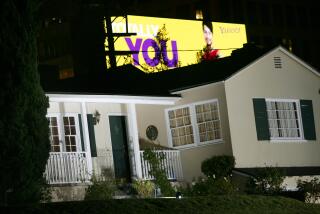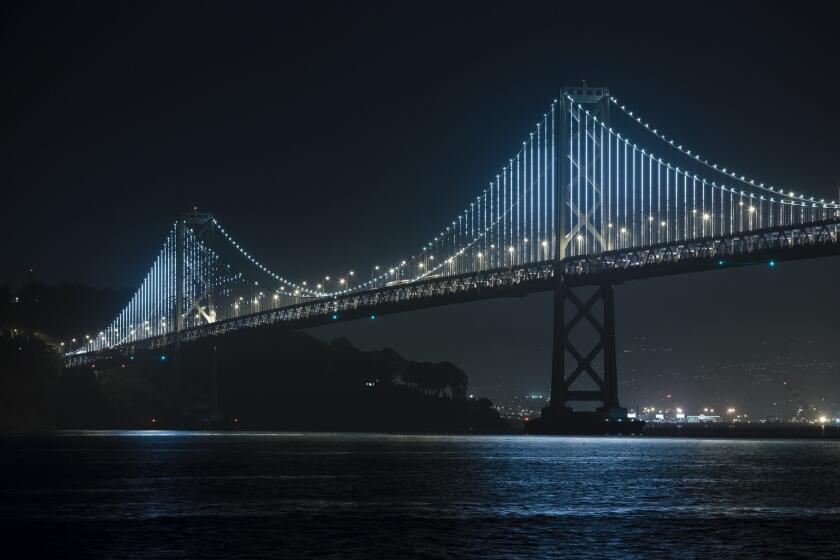Cable Firms’ Gifts for 2000 Festivities Raise Questions
Just weeks after pushing the city government to approve an Internet access policy favored by local cable companies, friends and allies of Mayor Richard Riordan helped solicit million-dollar contributions from those same firms for Los Angeles’ upcoming millennium festivities, according to cable industry sources and others.
The industry contributions, mainly in the form of $1-million gifts by Adelphia Communications Corp. and AT&T;, do not violate any regulations and do not enrich Riordan personally. But they have raised questions among some cable industry opponents, who see them as evidence of an unseemly relationship between the mayor and companies with major, ongoing interests in city decisions.
“These companies have to go back through Riordan’s technology commission for their franchise renewals,” said one lobbyist on the other side of the Internet debate. “If the mayor or his friends ask them for money, they don’t have a choice. That’s the nature of the process.”
The controversy over Internet access pits the companies, which say they should have the exclusive right to offer high-speed Internet hookups to their subscribers, against advocates of “open access,” who argue that cable franchises should be compelled to offer customers a choice of Internet access providers, along with their own.
Supporters of the mayor and others counter that the cable companies had multiple incentives for contributing, some of which might have weighed more heavily on them than the chance to please a mayor who already has recused himself from further involvement in the open access debate.
“L.A. is the largest market where we can brand our services,” said AT&T; spokesperson Genny Hom-Franzen, noting that the company plans to offer high-speed Internet access, cable TV, wireless phone and local phone service to some customers after it completes its purchase of Media One Group, which serves 500,000 customers in Los Angeles. “We are happy to raise our profile because L.A. is a very important part of our plan to offer bundled services.”
The firms that gave the money have made major investments in Los Angeles and are interested in improving relations with City Council members, not just Riordan. In the case of Adelphia, the company is taking over cable operations that had abominable reputations for service.
The gifts will go toward hosting a free set of city festivities and will help support the city’s libraries, which are benefiting from one of the millennium galas.
In an interview, Riordan adamantly denied ever contacting any cable company about giving to the millennium festivities, but acknowledged that others close to him had made approaches--which he said did not trouble him at all.
“It’s open what they’re doing. They’re being good citizens,” he said of the companies that have contributed. “You have to have some trust that it’s not going to affect city policy.”
Riordan added that the cable companies were not singled out for support.
“We solicited--I should say, the millennium group probably solicited--anyone they could,” he said.
Riordan himself has given $250,000.
Two sources, however, said Riordan specifically raised the issue with the contributors--a contention Riordan denied--while others said they were solicited by Rick Welch, the well-liked managing partner of Riordan’s old law firm, Riordan & McKinzie. Although Welch does not hold any position in the Riordan administration, his place at the head of the law firm that bears the mayor’s name, as well as his close relationship with Riordan, telegraphed the mayor’s support for the project.
Janet Karatz--a longtime Riordan friend whose former husband, Bruce Karatz, also is a Riordan backer--also reached out to some contributors, as did Bill Rosendahl, a public affairs show host and Adelphia Communications’ vice president of operations in Southern California.
In the case of the cable donations, the lead role was played by Rosendahl, according to various officials and Rosendahl himself.
Although Rosendahl is not directly connected to Riordan, some cable sources said the contributions, though made out to the Los Angeles Library Foundation, were a thinly veiled payback for the mayor’s support in the industry’s critical open access fight this summer.
“The words ‘open access’ never come up,” said one cable executive. “They don’t have to. You just know. I admire Riordan. The money did not go to a campaign fund or a Swiss bank account--it went to schools and libraries.”
Welch and others emphasized that point: that the contributions are going toward a civic gala that will benefit libraries and children. As such, some potential donors were drawn to the chance to demonstrate their civic involvement, he said.
What’s more, Welch argued that he and others had taken great care to keep Riordan away from any conflicts. “We were very, very diligent,” he said, adding that he had not even directly broached the matter with the cable companies, leaving that task largely to Rosendahl.
Still, many Riordan supporters said it obviously was no secret that the mayor backed the project and would welcome contributions to it.
Contributions connected to political interests are not unusual. Cable sources said that AT&T; in particular, which has been the main target of a nationwide campaign to force cable companies to open their networks to rivals, has given money to the campaigns of local politicians in cities debating new regulations, such as San Francisco. Those contributions normally have been in the $1,000 range.
In Los Angeles, Riordan, who is in his second and final term as mayor, weighed in heavily on the side of AT&T;, which argues that leasing its systems to Internet service providers would hurt its ability to recoup the billions it has invested in upgrading its networks and would delay the roll-out of new services such as local phone and high-speed Internet access.
As he reiterated Friday, Riordan argued that the best course for Los Angeles was to avoid taking action on the issue, instead deferring to Washington, “and hope that the federal government makes a national decision.”
So determined was Riordan to resist new regulations that three of his technology commissioners, all of whom favored open access to one degree or another, quit the commission rather than vote against the wishes of the mayor who appointed them.
That elevated a relatively obscure controversy into a major city debate, which Riordan then promptly dropped out of. After lobbying for his position, Riordan announced that he had a conflict of interest because his wife, Nancy Daly Riordan, owns stock in companies that could be affected by the debate, including America Online, the leading supporter of open access.
Riordan’s efforts on behalf of the millennium celebration have put him back in close contact with those same companies, however.
The mayor’s recusal from the open access debate was dated July 12. In August, Riordan hosted a dinner at his Brentwood home to thank contributors such as Adelphia and AT&T; for their gifts and pledges to the millennium event.
Among those attending were Leo J. Hindery Jr., who until recently was AT&T;’s cable president; Adelphia general counsel and vice president Randy Fisher; and Rosendahl.
Many people close to the millennium effort stress that the cable companies, particularly Adelphia, had many reasons unrelated to the open access debate to give money.
“This was a way for us to generate some name recognition and show our interest in being good corporate citizens,” said Fisher, whose company completed its purchase this month of one of the city’s leading cable operators, Century Communications. “No one knows us west of the Mississippi, and this helps us make an introductory splash in the market.”
Fisher acknowledged needing local approvals for taking over Century’s franchises, but said the contribution would not help him with regulators. “These people would eat me alive tomorrow. That’s what they love,” he said.
One cable executive said Adelphia also is eager to make up for the bad behavior of Century, which had a contentious relationship with the city because of its much-criticized customer service record and its reputation as an egregious rate hiker.
Century gives Adelphia more than 700,000 subscribers in Los Angeles, from Eagle Rock to Pacific Palisades and south to Redondo Beach. Los Angeles is the Coudersport, Pa.-based company’s biggest market.
AT&T; is a newcomer to Los Angeles. Its purchase this year of Tele-Communications, which has a small operation in the city but was the country’s largest cable operator, set off the open access movement.
AT&T; is now seeking the city’s approval to take over the local franchises operated by MediaOne Group, which it agreed to buy in May and serves about 500,000 customers.
More to Read
Start your day right
Sign up for Essential California for news, features and recommendations from the L.A. Times and beyond in your inbox six days a week.
You may occasionally receive promotional content from the Los Angeles Times.







